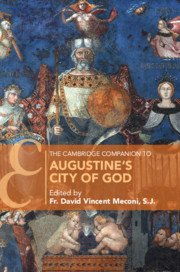Book contents
- The Cambridge Companion to Augustine’s City of God
- Cambridge Companions to Religion
- The Cambridge Companion to Augustine’s City of God
- Copyright page
- Dedication
- Contents
- Notes on Contributors
- Preface
- Abbreviations: Works by Augustine
- 1 Introduction
- 2 Book 1
- 3 Book 2
- 4 Book 3
- 5 Books 4 & 5
- 6 Books 6 & 7
- 7 Books 8–10
- 8 Books 11 & 12
- 9 Books 13 & 14
- 10 Books 15 & 16
- 11 Books 17 & 18
- 12 Book 19
- 13 Book 20
- 14 Books 21 & 22
- 15 Epilogue
- References
- Index
- References
11 - Books 17 & 18
Prophecy as Proof in Augustine’s City of God
Published online by Cambridge University Press: 21 August 2021
- The Cambridge Companion to Augustine’s City of God
- Cambridge Companions to Religion
- The Cambridge Companion to Augustine’s City of God
- Copyright page
- Dedication
- Contents
- Notes on Contributors
- Preface
- Abbreviations: Works by Augustine
- 1 Introduction
- 2 Book 1
- 3 Book 2
- 4 Book 3
- 5 Books 4 & 5
- 6 Books 6 & 7
- 7 Books 8–10
- 8 Books 11 & 12
- 9 Books 13 & 14
- 10 Books 15 & 16
- 11 Books 17 & 18
- 12 Book 19
- 13 Book 20
- 14 Books 21 & 22
- 15 Epilogue
- References
- Index
- References
Summary
In conf., Augustine recounts how he was led to Manicheanism, in part, by his repugnance to Old Testament passages in which a human-like body is attributed to God (conf. 3.7). Ambrose helps to release the grip that Manicheanism had on Augustine by showing him that it is not always necessary to read the Old Testament literally (conf. 6.4 and 7.1). In Books 17 and 18 of the ciu. Dei, Augustine both rejects the notion that all of the Old Testament is allegorical (the allegorical cannot negate the literal meaning, and sometimes the text is purely historical) and affirms that the most important meaning of the Old Testament is prophetic (ciu. Dei 17.3). The earthly kingdom in the Old Testament is inherently allegorical and prophetic. It is not a kingdom that is about or for itself; it is about and for the future heavenly kingdom. The work of the prophets is to prevent the earthly kingdom from being taken too literally – as a kingdom whose meaning is wholly in the present and in itself.
- Type
- Chapter
- Information
- The Cambridge Companion to Augustine's City of God , pp. 211 - 227Publisher: Cambridge University PressPrint publication year: 2021

